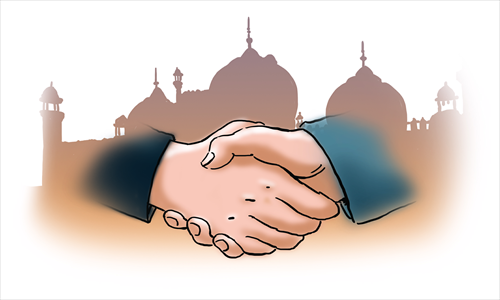Economic cooperation priority for Sino-Pakistani relations

Chinese Premier Li Keqiang is currently in Islamabad for a two-day visit.
During Li's planned four countries trip, India was his first stopover, which shows that China attaches great importance to big developing neighboring countries. But similar importance has also been paid to countries that are playing a vital role in South Asia such as Pakistan.
Despite the deadlock between India and Pakistan, as China always follows a parallel diplomacy, there is no balancing India by using Pakistan, and vice versa.
China and Pakistan have historically enjoyed strong political and economic ties.
Since 1951, relations between the two have been grounded in friendship and mutually beneficial cooperation. The phrase "all-weather" has been constantly used to describe this bilateral relationship.
This notion arose as no matter how the international dynamics and domestic situations in China and Pakistan changed, the relationship has never been affected.
This is still applicable today amid global anti-terrorist efforts and China's favorable relationship with other countries.
For China, Pakistan has geopolitical significance. In the late 1960s, Pakistan provided a channel for Sino-US communication. It prompted a secret visit by then national security advisor Henry Kissinger followed by the official visit of former US president Richard Nixon, which finally led to a new phase of Sino-US relations.
A less known effort by Pakistan is that it has tried to draw the relationship between China and Saudi Arabia.
In the current world arena, Pakistan can still play a supportive role for China.
For example, it can help stabilize China's largest autonomous region, the Xinjiang Uyghur Autonomous Region, which has been subject to terrorist attacks.
It can also boost China's relations with its northwestern neighbors, Central Asian countries, Gulf countries and even the Islamic world as a whole.
For Pakistan, China's help is especially needed on the economic side. Since the US initiated the Afghan War in 2001, Pakistan has been enormously affected.
Pakistani society has been thrown into division, for instance, the opinion split between the government and the army, and between the government and the high court. Terrorist movements threaten security in many regions.
Pakistan has just seen its first peaceful and democratic transition of power from one government to another in years, which is a hopeful sign.
However, a number of domestic issues remain, such as the worsening of its security environment, stagnation of its economy and withdrawal of foreign investment.
China has invested into Pakistan in a big way. Now there are over 13,000 Chinese working in Pakistan, and more than 120 projects are led by the Chinese side.
As Chinese companies make Pakistani people's lives easier, these companies have also gained overseas operation experience. It is not one-sided financial assistance, but mutually beneficial cooperation.
Fueling further economic cooperation has been prioritized in Li's Pakistan visit. The volume of trade between both countries is expected to be enhanced.
Chinese enterprises are mostly involved in fields like mining and basic infrastructure, and Pakistan is expecting China to invest in and develop other fields such as agriculture, energy and industrial zones.
More importantly, both can work together to find sustainable means for the economic development of Pakistan, based on China's technological support.
The article was compiled by Global Times reporter Wang Wenwen based on an interview with Zhou Gang, former Chinese ambassador to India and Pakistan. wangwenwen@globaltimes.com.cn